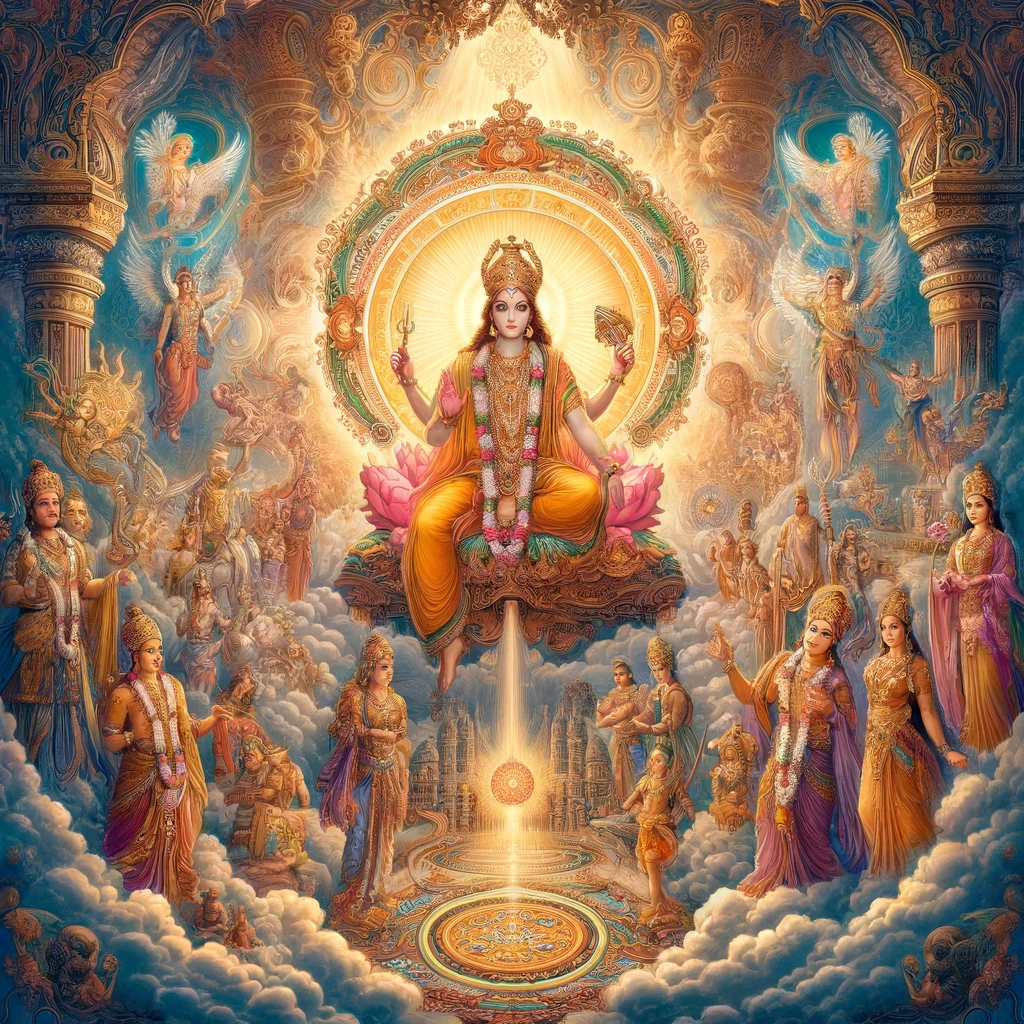ಓಜಸ್ತೇಜೋದ್ಯುತಿಧರಃ ಪ್ರಕಾಶಾತ್ಮಾ ಪ್ರತಾಪನಃ
ಋದ್ಧಃ ಷ್ಟಾಕ್ಷರೋ ಮಂತ್ರಃ (ಸ್ಪಷ್ಟಾಕ್ಷರಃ+ಮಂತ್ರಃ) ಚಂದ್ರಾಂಶುಃ ಭಾಸ್ಕರದ್ಯುತಿಃ || 30 ||
ojastejodyutidharaḥ prakāśātmā pratāpanaḥ
ṛddhaḥ ṣṭākṣaro maṃtraḥ (spaṣṭākṣaraḥ+maṃtraḥ) caṃdrāṃśuḥ bhāskaradyutiḥ || 30 ||
ojastejodyutidharaḥ (ಓಜಸ್ತೇಜೋದ್ಯುತಿಧರಃ)
The Lord, who possesses self-strength, valor, and effulgence, is the embodiment of ojas (vital energy), tejas (radiance), and dhyuti (splendor)
prakāśātmā (ಪ್ರಕಾಶಾತ್ಮಾ)
The divine as the embodiment of light and pure knowledge, as mentioned in the Gita.
ಜ್ಞಾನೇನ ತು ತದಜ್ಞಾನಂ ಯೇಷಾಂ ನಾಶಿತಮಾತ್ಮನಃ
ತೇಷಾಮಾದಿತ್ಯವಜ್ ಜ್ಞಾನಂ ಪ್ರಕಾಶಯತಿ ತತ್ ಪರಮ್ (ಅ-೫, ಶ್ಲೋ-೧೬)
jñānena tu tadajñānaṃ yeṣāṃ nāśitamātmanaḥ
teṣāmādityavaj jñānaṃ prakāśayati tat param (5.16)
It means that those who have removed ignorance through divine knowledge have their 'knowledge' shine like the sun, illuminating the ultimate truth. Thus, the divine, who is of the nature of light, is called Prakashaatma.
pratāpanaḥ (ಪ್ರತಾಪನಃ)
Triumphant over enemies, the one who resides within fire, and the one who dwells in the rays of the sun, the glorious Lord is called Pratapana. In the vision of the universal form revealed to Arjuna, the Lord appeared in this manner.
ಲೇಲಿ ಹೈಸೇ ಗ್ರಸಮಾನಃ ಸಮಂತಾತ್ ಲೋಕಾನ್ ಸಮಗ್ರಾನ್ ವದನೈರ್ಜ್ವಲದ್ಭಿ:
ತೇಜೋಭಿರಾಪೂರ್ಯ ಜಗತ್ ಸಮಗ್ರಂ ಭಾಸಸ್ತವೋಗ್ರಾ: ಪ್ರತಪಂತಿ ವಿಷ್ಣೋ (ಅ-೧೧,ಶ್ಲೋ-೩೦)
leli haise grasamānaḥ samaṃtāt lokān samagrān vadanairjvaladbhi:
tejobhirāpūrya jagat samagraṃ bhāsastavogrā: pratapaṃti viṣṇo (11.30)
The Lord, with blazing mouths that consume everything, filling all realms and swallowing them, is the fiery and resplendent one who seeks to incinerate the universe. This is the form of the Lord's fierce control, Pratapana.
ṛddhaḥ (ಋದ್ಧಃ)
"Riddhah" means the all-encompassing one. The Lord alone is always perfect and complete. For this reason, in the peace mantras found in the Vedas, it is said as follows:
ಪೂರ್ಣಮದಃ ಪೂರ್ಣಮಿದಂ ಪೂರ್ಣಾತ್ ಪೂರ್ಣಮುದಚ್ಯತೇ
ಪೂರ್ಣಸ್ಯ ಪೂರ್ಣಮಾದಾಯ ಪೂರ್ಣಮೇವಾವಶಿಶ್ಯತೇ
ಓಂ ಶಾಂತಿಃ ಶಾಂತಿಃ ಶಾಂತಿಃ
pūrṇamadaḥ pūrṇamidaṃ pūrṇāt pūrṇamudacyate
pūrṇasya pūrṇamādāya pūrṇamevāvaśiśyate
oṃ śāṃtiḥ śāṃtiḥ śāṃtiḥ
Meaning, that is also complete, and this is also complete. From the completeness, completeness arises. When completeness is subtracted from completeness, what remains is still completeness. Such is the Lord, 'Riddhah,' always complete.
ṣṭākṣaro maṃtraḥ (spaṣṭākṣaraḥ+maṃtraḥ) [ಸ್ಪಷ್ಟಾಕ್ಷರೋ ಮಂತ್ರಃ (ಸ್ಪಷ್ಟಾಕ್ಷರಃ+ಮಂತ್ರಃ)]
He is the one who is expressed clearly through the mantras containing the divine syllables. For example, in the fundamental mantra "Om Namah Narayanaya," these eight syllables 'Om,' 'Namah,' 'Narayanaya' are all the names of the Lord. Furthermore, each syllable also denotes the name of the Lord. Such is the Lord, 'Spashthaaksharo Mantrah,' clearly expressed through syllables.
caṃdrāṃśuḥ (ಚಂದ್ರಾಂಶುಃ)
The word 'ಚಂದ್ರ' (Chandra) and 'ಚಂದ' (Chand) both have the same meaning and originate from the Sanskrit root 'ಚಡಿ' (Chadi). When derived from the root 'ಚಡಿ' (Chadi), it becomes 'ಚಂಡಾ' (Chanda). 'ಚಂದ್ರ' means one who provides abundant happiness and joy, and it signifies the moon. 'ಚಂದ್ರ+ಅಂಶ' (Chandra + Amsha) means the one who bestows coolness and comfort to the entire world. In the Vedas, the Lord is described as, "ಶೀತಾಂಶು ಮಂಡಲಗತಂ ಸ್ಮರತಾತ್ಮ ಸಂಸ್ತಂ" (Sitamshu Mandalagatam Smaratatma Sanstam), which means the one who resides in the moon and sends down the nectar through the moon's rays, providing us with the necessary life force to dispel the darkness within us. Our inner world is filled with darkness, and the divine full moon radiance of Lord caṃdrāṃśuḥ is essential to dispel it.
bhāskaradyutiḥ (ಭಾಸ್ಕರದ್ಯುತಿಃ)
For yogis, when they envision the Lord within their inner eye, He appears as brilliant as a thousand suns rising simultaneously. However, the Lord, in the form of the moon, shines with the same intensity but offers a soothing and joyful radiance. He is as resplendent as the sun but has the gentleness and blissful quality of the moon. The Lord is like the moon, and His radiance is akin to moonlight, making Him Chandramayi, the embodiment of moonlight.


